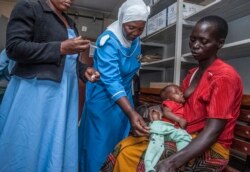LONDON — Malaria could be wiped out in a generation if $2 billion more every year is invested in tackling the disease, according to a report published Wednesday in the medical journal The Lancet.
Malaria kills around 435,000 people every year, most of them children. Significant progress has been made this century in fighting the disease, with the number of deaths cut in half since 2000. But, eradicating malaria won't be easy, says Professor Jake Baum, who leads the malaria research network at Imperial College London.
"You might think that right now, that's the trajectory. The challenge is in the last couple of years things have stagnated," he said.
Just five African countries account for half of the global malaria burden. Burundi is in a malaria outbreak, with doctors there noting an urgent need for investment in health care.
"Everyone should know that malaria is a disease of the poor and in terms of national health policy, malaria remains the leading cause of death," said Dr. Albert Mbonerane, founder of the Saint François d'Assise Anti-Malaria Center in Burundi.
The report — written by 41 of the world's leading malaria experts — estimates that $4.3 billion is spent globally on fighting the disease each year, and that another $2 billion will be needed annually to wipe it out by 2050.
Eradication of malaria — which is transmitted by the Anopheles mosquito — will also require new tools, which might include so-called "gene drives" that could make mosquito populations collapse or render them resistant to the malaria parasite.
"We need every piece of the jigsaw puzzle," Baum said. "So to say that just controlling vector would be the magic bullet, or just coming up with a new drug would be the magic bullet, I think most would agree that's naive. I think we need the new frontier of tools that maybe don't even exist yet."
A malaria eradication program was attempted in the 1950s, but abandoned a decade later. New focus and investment in recent decades, particularly from the Bill and Melinda Gates Foundation, have given renewed impetus. However, there are some concerns.
"The last thing we want is to say we're marching toward eradication but then you get that donor fatigue and stakeholder fatigue of 'we're just not getting there, we're just not making progress; this is failing,'" Baum said.
The United Nations' global malaria director, Dr. Pedro Alonso, says better overall health care is critical.
"Without adequate health care, people-centered, properly financed systems, we will not achieve eradication," Alonso said.
The report's authors say malaria eradication will require a huge commitment, but the social rewards will be worth the investment.






